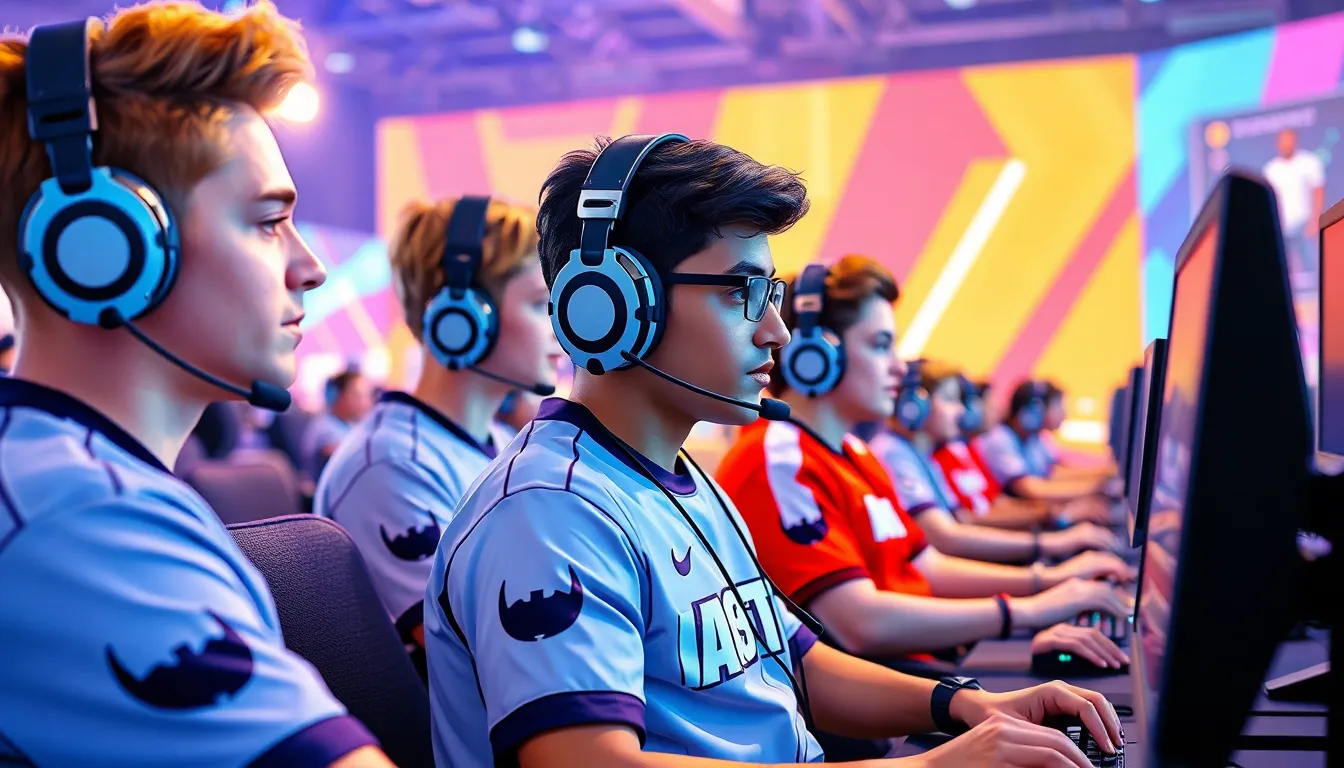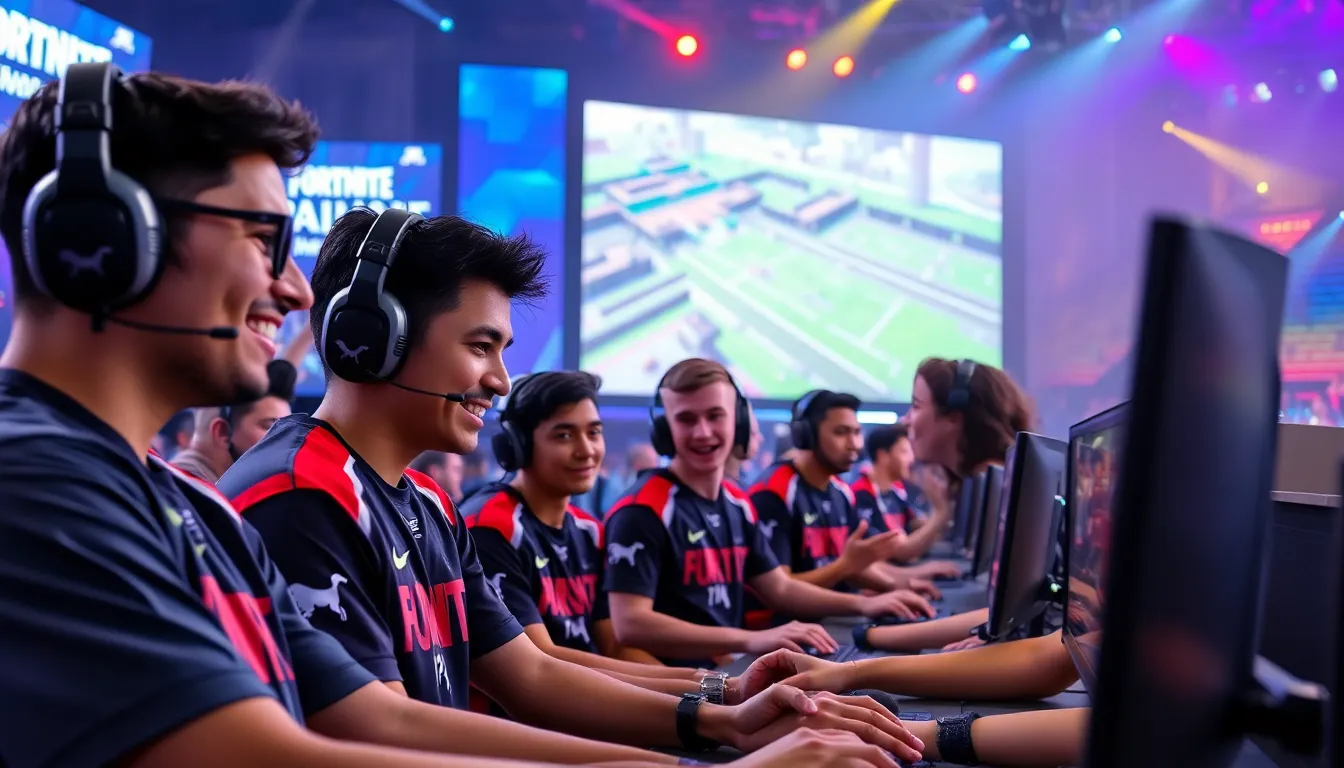Table of Contents
ToggleIn the fast-paced world of gaming, Fortnite esports teams are redefining what it means to be a champion. With their flashy dances and intense build battles, these squads are not just playing for bragging rights; they’re competing for glory, cash prizes, and a spot in the hearts of fans everywhere. Who knew that constructing a mansion while dodging bullets could turn into a multi-million dollar spectacle?
Overview of Fortnite Esports Teams
Fortnite esports teams have significantly impacted the gaming landscape. These teams not only compete for prizes but also foster vibrant communities.
The Rise of Fortnite in the Esports Scene
Fortnite’s popularity soared following its release in 2017. It quickly captured the attention of both players and viewers. Teams emerged, each striving to establish dominance in the competitive realm. Notable organizations like FaZe Clan and Team Liquid invested heavily in top players. Streaming platforms amplified the game’s visibility, allowing fans to engage continuously. As competitive events gained traction, more players aspired to join professional teams.
Major Tournaments and Competitions
Fortnite hosts numerous high-stakes tournaments every year. One prominent event is the Fortnite World Cup, offering millions in cash prizes. Various competitions attract teams worldwide, creating diverse matchups. Another key tournament, the FNCS, showcases season-based competitions where teams accumulate points. Both casual and competitive players participate, enhancing the esports ecosystem. Events attract massive viewership, with millions tuning in for live broadcasts and highlights.
Top Fortnite Esports Teams

Fortnite esports has produced several prominent teams that dominate the competitive landscape. Each team showcases unique skills and strategies, contributing to the thrilling environment of Fortnite competitions.
Team Liquid
Team Liquid stands out among Fortnite esports teams, known for their exceptional talent and strategic gameplay. Established in 2000, it has made waves across various games, achieving success in Fortnite tournaments. Their roster features top players like Fortnite World Cup Champion Bugha, who secured the spotlight in 2019. Team Liquid emphasizes training and player development, creating a supportive environment for its talents. Committed to excellence, this team not only competes for cash prizes but also engages fans through community events and streaming content.
FaZe Clan
FaZe Clan captures attention in the Fortnite esports scene with its iconic brand and skilled players. Founded in 2010, it quickly rose to prominence by attracting top talent, including Fortnite stars like Dubs and Mongraal. FaZe Clan combines jaw-dropping gameplay with a strong social media presence, allowing them to connect with fans worldwide. Their participation in major tournaments like FNCS highlights their competitiveness while also showcasing their dedication to the Fortnite community. By focusing on entertainment and excellence, FaZe Clan remains a leading force in the esports industry.
TSM (Team SoloMid)
TSM has established itself as a powerhouse in Fortnite esports, known for its tactical gameplay and high-profile players. Formed in 2009, TSM expanded into Fortnite, enlisting talented figures such as ZexRow and Daequan. Their strategies emphasize teamwork and communication, often leading to outstanding tournament performances. Recognized for its commitment to player welfare, TSM invests in mental health resources and professional development. Engaging fans through streaming and social content strengthens their community ties, further solidifying TSM’s position in the competitive Fortnite landscape.
Team Strategies and Playstyles
Fortnite esports teams employ varied strategies to maximize their chances of winning competitions. Each team adapts its approach based on strengths, weaknesses, and playstyles of opponents.
Aggressive vs. Defensive Tactics
Aggressive teams prioritize offensive strategies, leaning towards attacking opponents quickly. Victory often comes from high-pressure situations where they secure eliminations rapidly. Players like Dubs and Mongraal exemplify this playstyle, ensuring constant movement and quick engagements. On the other hand, defensive teams focus on survival and positioning. These teams build elaborate structures to protect themselves while waiting for the right moment to strike. By staying aware of the storm’s movement, defensive players create opportunities to pick off opponents without exposing themselves.
Communication and Teamwork
Effective communication forms the backbone of successful Fortnite teams. Players utilize voice chat to relay information and coordinate strategies. Clear calls about enemy positions or loot locations significantly enhance team dynamics. Trust in teammates fosters better decision-making. Team Liquid’s Bugha often emphasizes the importance of synergy during tournaments. He and his teammates practice regularly to improve coordination, ensuring everyone understands their roles during matches. By combining individual skills and maintaining open lines of communication, teams navigate the competitive landscape more successfully.
The Future of Fortnite Esports Teams
Fortnite esports teams are on the brink of exciting developments that promise to reshape the competitive landscape. Growth in emerging talents and innovative team strategies signals a vibrant future.
Upcoming Talents and Emerging Teams
New talent consistently enters the Fortnite competitive scene, bringing fresh perspectives and skills. Players like Jaden “Nicks” Lee showcase exceptional prowess in tournaments, often leading their teams to victory. Additionally, teams like Breakthrough and FaZe Clan’s academy roster emerge as noteworthy contenders, prioritizing young gamers and fostering their growth. These organizations emphasize training and mentorship, ensuring that the next generation of players has the resources needed to excel. Competitive exposure through online qualifiers amplifies their visibility and bolsters fan engagement, yet many of these teams also focus on creating supportive environments, contributing to the overall health of the esports ecosystem.
The Impact of Changing Game Dynamics
Developments in Fortnite’s gameplay dynamics significantly influence team strategies and performance. Regular updates, map changes, and new mechanics constantly shift the competitive landscape, requiring teams to adapt quickly. Strategic adjustments become essential, as playstyles evolve to leverage game changes effectively. Now, teams that embrace flexibility and innovation often outperform their rigid counterparts. Competitive formats also introduce new challenges, compelling players to refine communication and synergy. As the game evolves, teams must prioritize collaboration and practice to fully harness their skills and maintain a competitive edge. The need to stay ahead of trends and adapt strategies fosters a dynamic environment, ensuring that Fortnite esports teams remain relevant in the ever-changing landscape.
Fortnite esports teams are reshaping the competitive gaming landscape with their unique blend of skill and strategy. As they continue to engage fans and foster communities, the excitement surrounding these teams only grows. The commitment to training and innovation ensures that both established teams and emerging talents will keep pushing the boundaries of gameplay.
With major tournaments and significant prize pools on the line, the stakes have never been higher. Players are not just competing for glory; they’re building careers in a thriving industry. As Fortnite evolves, so will the strategies and dynamics of these teams, promising an exhilarating future for esports enthusiasts everywhere.




